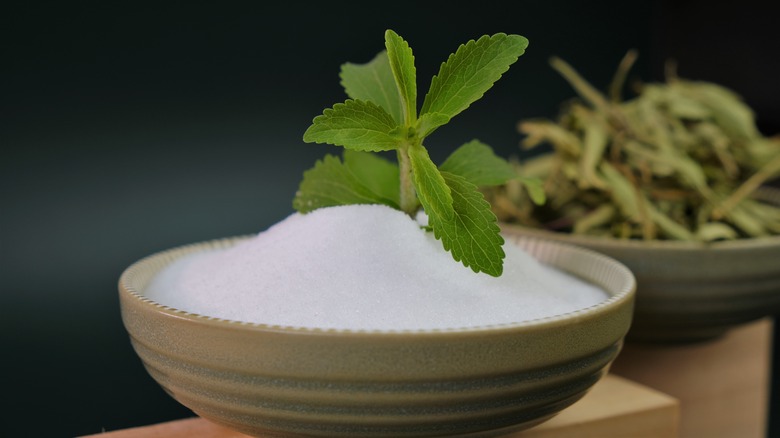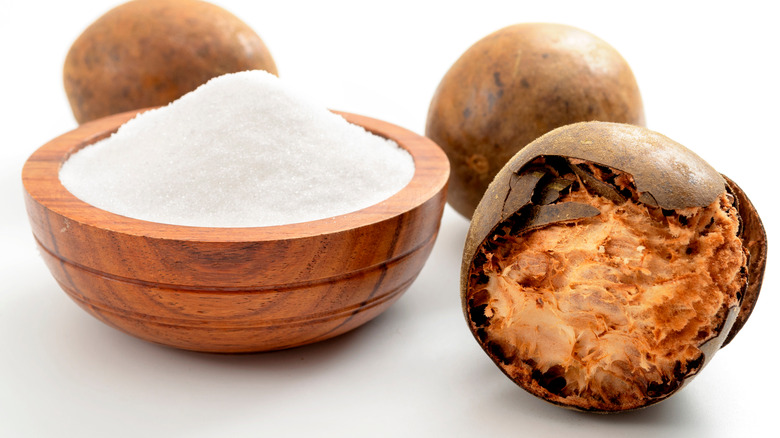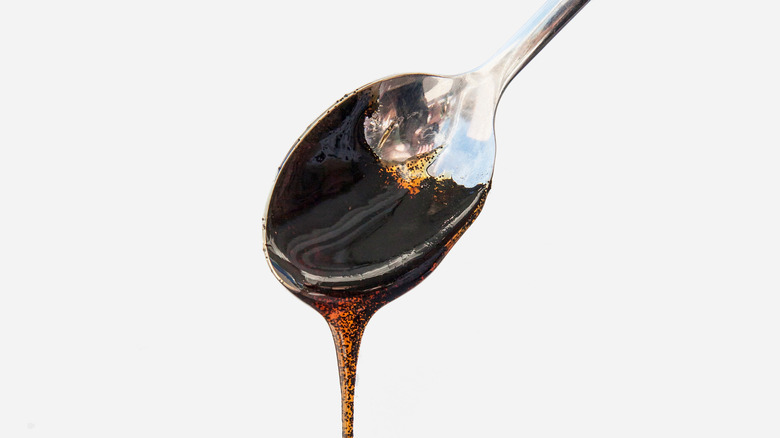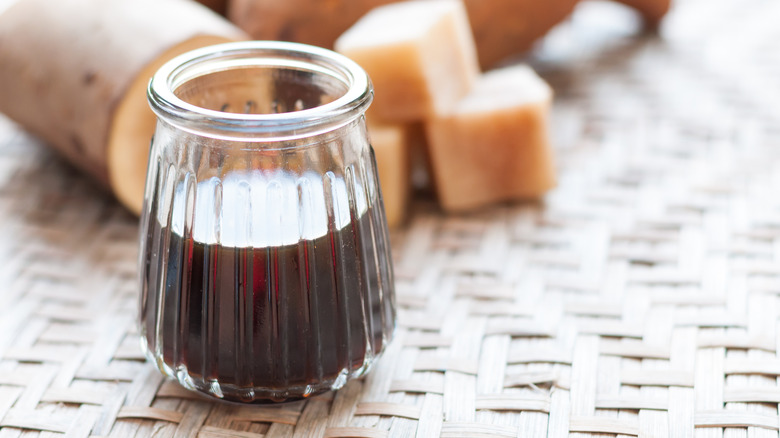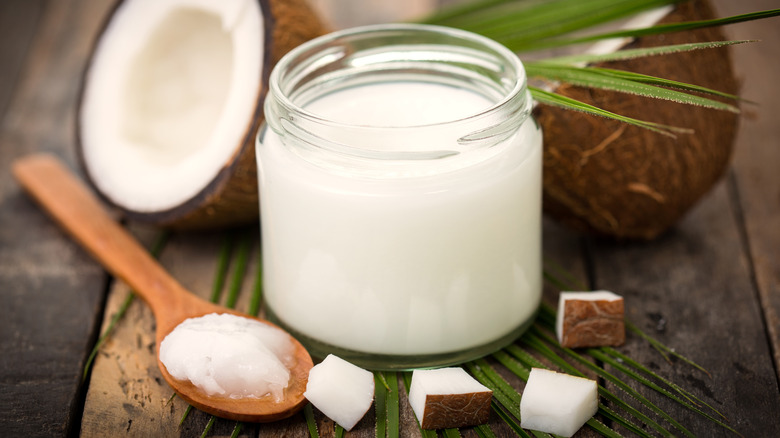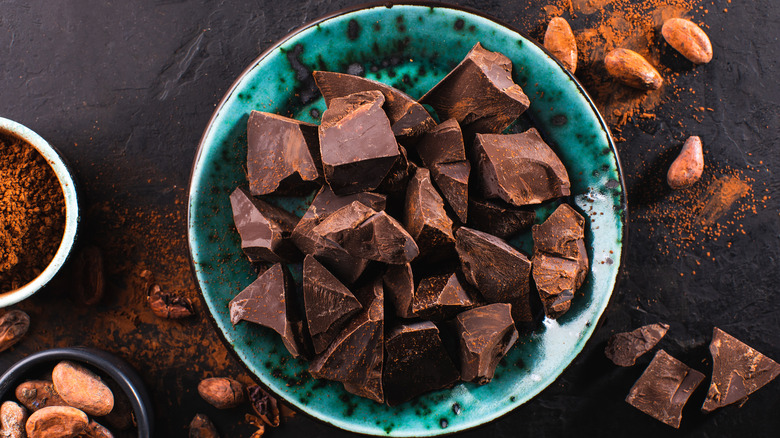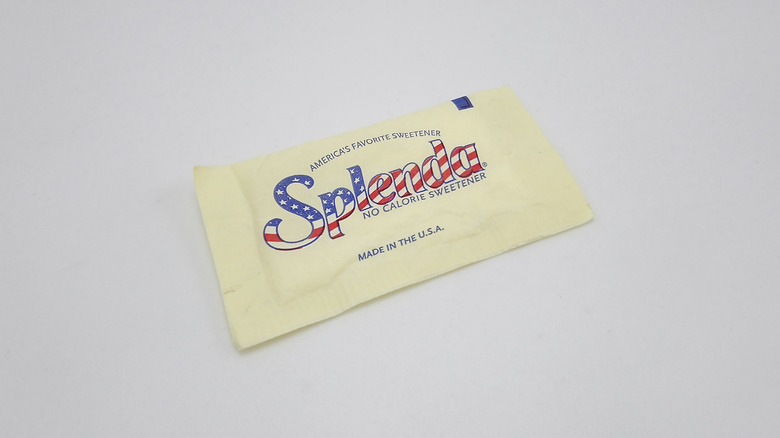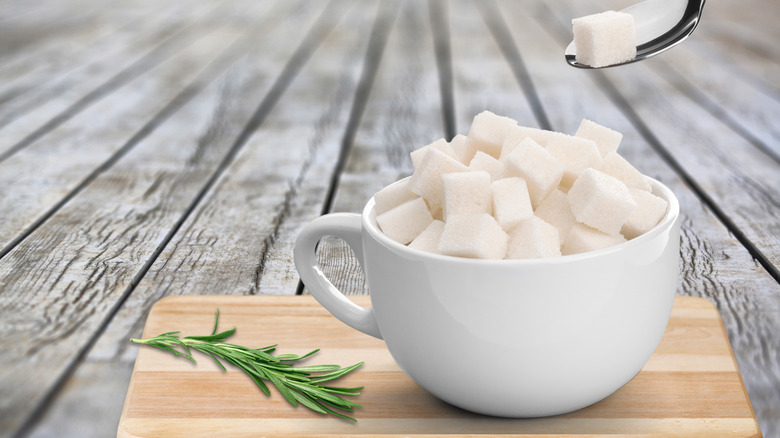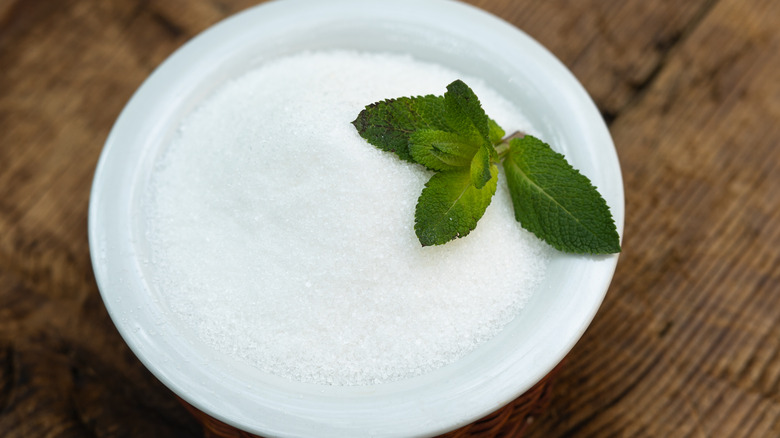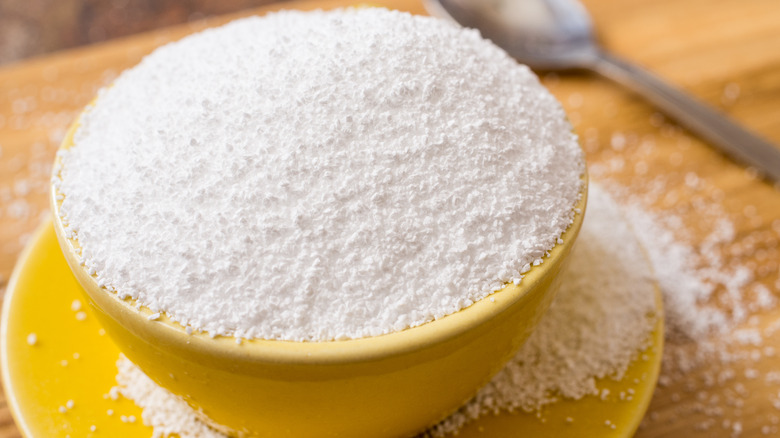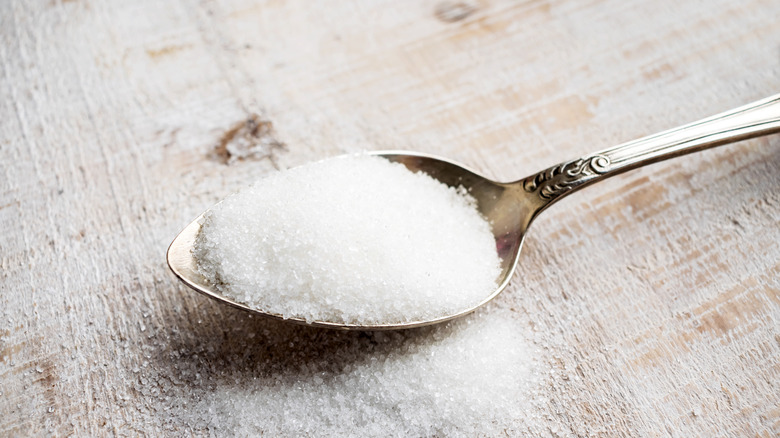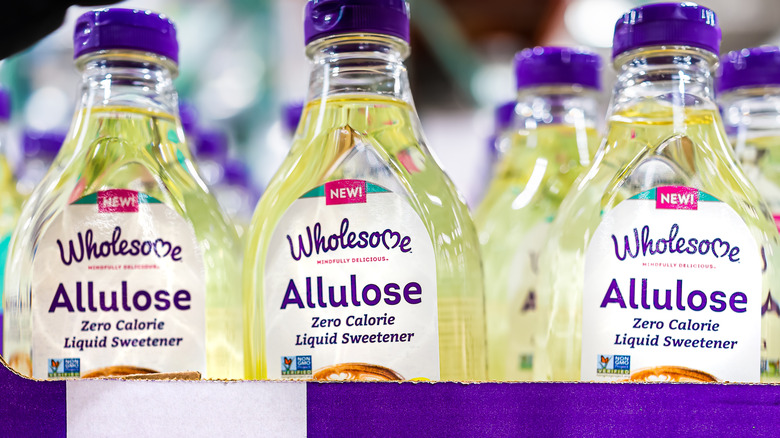The 12 Best Keto-Friendly Sweeteners For Your Coffee
The ketogenic diet, also known as "keto," is a low-carb diet that became popular in the 1970s. However, from a medical perspective, according to the Harvard T.H. Chan School of Public Health, the keto diet goes way back to the 19th century, when it helped control diabetes. The keto diet principle is to reduce the carbohydrate intake to less than 50 grams a day (sometimes even 20 grams) and increase the fat intake to 70-80 percent of total daily calories.
The low carb intake can create a problem if you follow the keto principles, as you will have to rely on alternative means of satisfying your sweet tooth. But what about coffee? And what if you won't take your coffee black and unsweetened? There is always the option of keto-friendly coffee. Also known as bulletproof coffee, this is coffee enhanced with butter and can be considered a keto meal on its own. However, if you want to get your energy kick in the morning, indulge in something sweet, and still adhere to keto principles, try using one of these keto-friendly sweeteners for your coffee.
Stevia
A keto-friendly sugar substitute made from the leaves of the Stevia rebaudiana plant, stevia is a natural sweetener. The plant is native to South America, and locals have been using it for cooking for eons. When scientists discovered that they could isolate the sweet compounds in stevia, they used it to extract a substance 300 times sweeter than table sugar (via Ketogenic). The sweetener is made from the leaves of the plant. After harvesting, they are dried and steeped in water. The active sweet compounds are isolated from the resulting liquid, and the final product has no carbohydrates, calories, or artificial sweeteners.
Stevia is seldom used in this pure form. Instead, it is usually combined with other sweeteners, such as erythritol, because it has a bitter aftertaste in its original form. Another reason for combining stevia with other substances is that the plant extract is very light, and a minimal amount is necessary to obtain the sweet taste. Hence, the products on the market need something to give them bulk. Stevia is one of the best keto-friendly sweeteners for coffee, as it is minimally processed and brings several health benefits alongside the delicious taste. It is beneficial for oral health, reduces plaque levels, and is also recommended for diabetic individuals because it helps manage blood sugar levels and has antioxidant properties. Among keto-friendly sweeteners, stevia is probably the most used, as it provides a sweet taste, comes with some health benefits, and has virtually no side effects.
Monk fruit
Monk fruit is a Chinese melon variety commonly used in traditional Chinese medicine under the name luo han guo. The monk fruit sweetener is extracted from the fruit's juice and mainly contains a type of antioxidant called mogroside. Monk fruit sweetener is commercialized both as a syrup and a powder. The syrup and the powder include monk fruit extract and other sugar substitutes, such as erythritol and dextrose, which reduce the intense sweetness and the bitter aftertaste and give the sweetener a sugar-like texture.
According to Ketogenic, monk fruit sweetener is suitable for a Keto diet, as it is low in carbs and calories. It is also suited for diets that strive to balance blood sugar levels. The monk fruit sweetener is almost 250 times sweeter than sugar, meaning that only a tiny quantity will produce a pleasant sweet taste. Traditional Chinese medicine uses monk fruit for its anti-inflammatory properties. In rare cases, a monk fruit allergy can occur. People who experience this allergy are also allergic to vegetables from the gourd family, such as melon, squash, cucumber, and pumpkin. Monk fruit sweetener is suitable for your coffee and other keto recipes requiring a sweetener, as it doesn't modify its taste when exposed to high temperatures.
Sugar-free coffee syrup
Coffee syrup is a very appreciated choice for giving your coffee an extra sweet flavor. The most popular coffee syrup flavors include hazelnut, chocolate, vanilla, caramel, lavender, peppermint, and rose. But the crucial ingredient in coffee syrups, sugar, is an absolute no-no on a keto diet. Fortunately, many coffee syrup producers have developed keto-friendly options for their products. Sugar-free coffee syrups use natural sweeteners, such as plant-based stevia and monk fruit, or artificial syrup sweeteners, such as aspartame, sucralose, and neotame.
If you add a sugar-free coffee syrup to your coffee and want to follow keto rules, use syrup with keto-friendly ingredients. Many keto-friendly coffee syrup varieties, including brands used in coffee chains, are widely available. For example, Starbucks offers a great variety of keto-friendly drinks, which you can get if you customize your order. The secret is the brand's sugar-free vanilla syrup, which you can use to make your coffee sweet and bring that warm hint of vanilla. As vanilla is a mild and versatile flavor, you can use a sugar-free vanilla syrup as the basis for any syrup and add more aromas. For example, for a pumpkin spice latte, you can add some cinnamon, nutmeg, and clove to the syrup and complete the drink with plant-based, sugar-free milk.
Yacon syrup
Another plant-based sweetener that is keto-friendly is yacon syrup. Derived from the yacon plant's roots, a tuber resembling the sweet potato, the plant is native to the Andes Mountains in South America. According to Perfect Keto, yacon has some health benefits (prebiotic fiber, antioxidants), but its most important quality is that it helps keep insulin levels stable and reverses insulin resistance. It is also beneficial for the optimum functioning of the heart and gives you energy throughout the day.
Yacon syrup is made by crushing the roots to release juice and then filtering and evaporating the juice. The result is a thick liquid with a dark color that resembles molasses. Yacon syrup contains soluble fibers, which the human body can't digest, so the digestive system does not decompose them. This characteristic translates into a low glycemic index. However, yacon syrup contains some fructose and glucose, so it is not entirely sugar-free. Therefore, it should be consumed in moderation if you want to adhere to keto principles. Also, yacon syrup contains inulin, a type of prebiotic fiber which some people have trouble processing if ingested in large quantities. In this situation, it can cause bloating and cramps. The upside is that only a few drops of yacon syrup are enough to make any dish sweet. Therefore, it can be a sugar substitute for your coffee or baking.
Coconut milk
Coconut has one of those flavors which you either love or hate. For those who enjoy the flavor, coconut is a welcome addition to most beverages and foods. So, the fact that more and more food ingredients are derived from coconut is good news to coconut lovers.
Coconut milk is one of those ingredients. It is made from pureed coconut flesh, is less creamy and fatty than coconut cream, but carries the same nutty flavor. With a carb content low enough to be considered keto-friendly (via Healthline), coconut milk has a natural-occurring sweetness that can be most welcome in your coffee.
There is another huge advantage to using coconut milk in your keto coffee. It offers a lactose-free alternative to milk, so you can still enjoy your favorite lattes or cappuccinos. Lactose intolerance can be complicated to incorporate into a keto diet. Still, coconut milk has the double advantage of being a lactose-free source of fat and having a slightly sweet taste. Make your coconut milk by blending coconut flesh with water (and then straining the liquid) or by mixing coconut cream with warm water. You can add it to your coffee to get the subtle taste of coconut and a hint of sweetness, or you can use it for several other keto-friendly, sweet or savory dishes. The advantage of coconut milk is that it can act as a sugar and milk substitute.
Dark chocolate
A delicious treat, dark chocolate has particular health benefits that other types of chocolate lack. Quality dark chocolate has no added milk solids and consists only of cacao beans, emulsifiers, and perhaps flavorings. In many cases, it also lacks sugar or is made with sugar substitutes. Dark chocolate can be part of a keto diet if it contains at least 75% cocoa solids (via Ketodietapp). If chocolate has a lower amount of cocoa, it is likely to have a higher carb content, which is unsuitable for keto diets.
Pay attention to portions if you use dark chocolate as a keto sweetener for your coffee. According to Healthline, the 5 percent carb intake in a keto diet means 1 ounce of dark chocolate, which accounts for 40 percent of a day's worth of carbs. Therefore, if you use dark chocolate on keto, you should limit other high-carb foods. Adding a small piece of dark chocolate to your coffee will result in a mocha coffee, a type of coffee with a rich chocolate taste. You can use either solid dark chocolate, as it will melt in the hot coffee, or sugar-free chocolate syrup. The mocha coffee recipes in coffee shops usually call for chocolate syrup, but you can get the same flavor using solid chocolate.
Sucralose
Approved by the FDA as a non-nutritive sweetener in 1998, sucralose quickly became one of the best-selling artificial sweeteners. Sucralose is primarily marketed as Splenda, a sugar substitute that became the market leader in the early 2000s (via The Washington Post). The chemical compound was discovered by accident. While working on another project, scientists found that sucralose had a sweet taste and concluded that it could replace sugar. Sucralose is 600 times sweeter than sugar and is marketed as a zero-calorie product.
According to Healthinsider, you can use sucralose on a keto diet if you adhere to the so-called dirty keto (the diet based only on the nutritional value of food). As a low-carb sweetener, sucralose is keto-friendly. However, like all artificial sweeteners, it can increase sugar cravings, so you should consume it in moderation. It can also cause digestive problems when ingested over long periods, so it is better to add it to your coffee only occasionally. The potential issues of this sweetener come from the bulking agents used in making Splenda. Dextrose and maltodextrin make up the most significant amount of a Splenda pack and are needed to increase the volume of the sweetener and make it resemble sugar. While it is safe when added to coffee, sucralose can lose its taste and texture when exposed to high temperatures, so make sure you don't use it for baking.
Erythritol
Erythritol is a type of sugar alcohol widely used as a sweetener. It appears naturally during the fermentation process of wine and beer. However, as a sugar substitute, it is extracted artificially. In this form, it is often mixed with other substitutes, even plant-based ones, such as stevia, to increase the volume of the product. Erythritol is a sought-after alternative as it has zero calories and doesn't affect glucose or insulin levels. According to WebMD, the maximum erythritol amount the human body can tolerate is 1 gram for every kilogram of body weight.
According to Ketogenic, erythritol is suitable for a keto diet. Compared to stevia or monk fruit sweetener, it has the advantage that it can replace sugar in recipes in the same quantities and has a similar texture (crystal granules or powder). The texture is also why producers combine it with other sweeteners, making it easier to measure amounts and replicate consistency. Erythritol is excellent for sweetening coffee or tea and can be used for baking. Remember that a different chemical composition than that of sugar may cause changes in flavor and consistency when baking. Compared to other sugar alcohols, erythritol causes digestive issues for fewer persons. However, it would be best if you consumed it in moderation.
Xylitol
Another sugar alcohol, xylitol, is a substance that occurs naturally in fruits like plums, strawberries, and vegetables like cauliflower and pumpkin. It is also produced industrially and used as a food additive and sugar substitute. For example, it is an ingredient in many brands of sugar-free chewing gum, candies, but also toothpaste, and dietary supplements. According to Healthline, xylitol is as sweet as sugar but doesn't raise blood sugar or insulin levels as the digestive tract does not absorb it. This characteristic makes it a keto-friendly sweetener, ideally suited for coffee, tea, or smoothies.
Xylitol is marketed as beneficial for oral hygiene, which is also why the substance is an ingredient in toothpaste. Unlike sugar, it doesn't affect teeth and is no cause for tooth decay. In fact, products containing xylitol are often presented as helpful in reducing cavity risk (via WebMD). Some producers claim it can also treat or ease ear infections, but not enough medical studies support this yet.
Another excellent use for xylitol is baking. While it is safe for humans to eat (it can cause digestive problems for some individuals), it is highly toxic to dogs, so make sure your pet isn't anywhere near when you add it to your food or drinks.
Sorbitol
A carbohydrate belonging to the sugar alcohol class, sorbitol is 60 percent as sweet as sugar and contains one-third fewer calories. It occurs in natural form in fruit, such as berries, apples, and peaches, and it is also artificially produced for the food and drug industries. The production process means extracting the sugar alcohol from glucose. Like other sugar alcohols, sorbitol is incompletely absorbed from the small intestine, resulting in lower insulin secretion and glucose levels.
According to Healthline, sorbitol and other sugar alcohols, such as erythritol, xylitol, and isomalt, are keto-friendly. The only sugar alcohol not suitable in keto diets is maltitol. Like other sugar alcohols, sorbitol can cause digestive issues when consumed in larger quantities. In the pharmaceutical industry, sorbitol is a laxative. However, the drug based on sorbitol has much more chemical substance than the sweetener. According to The U.S. Food and Drug Administration (FDA), laxative effects can occur when consuming more than 50 grams of sorbitol in one day. Sorbitol can be added to coffee, tea, and baked dishes, as high temperatures do not alter its chemical consistency.
Tagatose
Tagatose is a low carbohydrate functional sweetener that occurs naturally in some dairy products and fruits such as apples, pineapples, oranges, raisins, and dates. According to Ketodietapp, tagatose is artificially produced from lactose, resulting in a white substance resembling sugar. It is almost as sweet as sugar but has a much lower glycemic index, as it provides half the calories in sugar (1.5 kcal/gram). Just like with alcohol sugars, the digestive system metabolizes tagatose slower than sugar. Although more research is necessary for certainty, tagatose may present certain health benefits. For example, tagatose can benefit people with type 2 diabetes, as early studies have shown that it can help manage glucose and insulin levels. Other tests have shown that tagatose has a beneficial effect on weight loss.
Tagatose is suitable for a keto-friendly diet and is an excellent option as a sugar substitute. The best aspect of using tagatose as a sweetener is that it resembles sugar when exposed to heat. In other words, tagatose caramelizes. So, in terms of adding it to your keto-friendly coffee, you can use it as a simple sweetener or make sugar-free caramel syrup. Tagatose is an ideal keto coffee sweetener if you're a caramel latte fan. Despite a somewhat tricky beginning in the U.S. market due to production costs, tagatose is now easier to come by and can make a difference in eating keto.
Allulose
Allulose is a rare sugar because it occurs in nature only in a few fruits, such as figs and raisins. According to WebMD, allulose has 90 percent fewer calories than sugar and is a little less sweet, making it a good substitute. In addition, because the digestive system doesn't metabolize it, allulose is keto friendly (via Healthline). Because of these reasons, allulose is often recommended for managing diabetes or weight loss.
Add allulose to your coffee or tea and use it in keto-friendly baked recipes. As it is more expensive than other sugar substitutes, you can use it with other low-calorie sweeteners such as stevia or monk fruit. In addition, many food producers mix different sugar substitutes to cover the bitter aftertaste of plant-based sweeteners and provide a texture similar to sugar. When using allulose, keep in mind that it can cause digestive problems when ingested in large quantities, so limit the amount.

